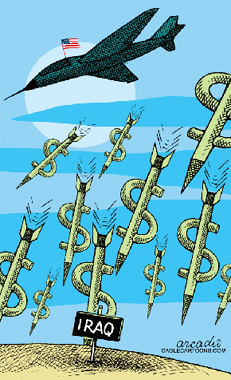For the entirety of my life as an American, I have heard the adage, “War is good for the economy!” You’ve probably heard it too. In fact, the idea itself has become so finely woven into the fabric of the collective American psyche that we have all but ceased examining if it is actually true. Is war good for an economy?

At best, it can only be said that war is economically good for a select few, but ultimately bad for the majority, not only economically, but spiritually as well.
The idea itself really began taking hold in the American consciousness during World War II. Previously in the grips of the Great Depression, Americans began to be thankful for the war as it created jobs that previously didn’t exist in order to support the war effort. Problem was, once the war was over, many of those jobs once again disappeared. So, were the jobs created actually productive jobs? Or, perhaps more accurately framed, did those jobs end up “creating” anything that could sustain an economy without a war? The obvious answer is, “No, they did not.”
In reality, the American economy did not begin to prosper until after World War II ended, during a period of relative peace. However, during that same era, the military industrial complex began to weave its way into a permanent place in the American fabric. Perceiving a clear and present danger to America’s future in the form of communism, the production of armaments to defend our national security became a permanent need, a moral imperative, if you will, that was beyond questioning or critical examination. Insofar as these efforts implied that the lives of individual American citizens, serving as soldiers, depended on such armaments, it has become all but treasonous to question the assumptions that lead to, promote and perpetrate war.
Bombs, weapons, planes, tanks, helicopters and all other material items to support a war are being produced only to be used up a short time later for the purposes of destruction. Many of these same agents of destruction are themselves prone to destruction in the process. Surely, it does not take a doctoral degree in economics to understand that to build something for the purposes, means and ends of destruction, is not the same as really creating something of lasting value. While an economy based on war could be said to be economically beneficial to some, it most assuredly is not beneficial to the majority. A sound and stable economy would, as a matter of sound economic principle, use its material and human resources to create for the benefit of all concerned, rather than to destroy to economically benefit a select few, even under the auspices of providing national security for the majority.
Is War Good For The Economy?

The money spent on the Iraq and Afghanistan wars is money spent on destruction rather than creation.
This coming September 11th, we will mark the 10th anniversary of the events of 9/11. Retaliation against those attacks on American soil became the basis and justification for the subsequent wars in Iraq and Afghanistan. The year before 9/11, the heady, “irrational exuberance” of the dot.com boom years had evaporated, and there appeared nothing on the economic landscape to replace it at least in terms of projected economic growth. Then 9/11 happened and suddenly everything changed.
Using the threat of mythical WMD’s and biological weapons allegedly in the hands of Iraq and Saddam Hussein, as well as the “need” for retaliation against Osama Bin Laden and Al Qaeda for the terrorist strikes against America, we were all of us led down a path towards a war that was already decided upon as a means of rescuing an economy that was set to downright flag and flounder compared to the Clinton years. Initial budget figures to support a war effort were disclosed to Congress and the American people. We were sold the war on the assumption that it would require tens of billions of dollars to win, or to achieve the objective of unseating Saddam Hussein and dismantling Al Qaeda. Regardless of the red flags Americans everywhere, including our elected leaders, should have heeded, the decision for war was all but forced upon us and off we went.
At this point, over the last nine years, the cost of war has jumped from tens of billions of dollars needed to over a trillion dollars actually spent, and we’re still spending. With that much money infused into the economy, it would seem we should be propsering. That is, if war is actually good for the economy. However, based on your own observations as an aware citizen of the world, ask your own self, is war really good for the economy?
Economically speaking, are you personally better off today after almost 10-years of war than before 9/11? If you work in an industry providing resources directly to the war effort, you may answer, “Yes, I am better off, economically speaking.” However, we don’t have to look very hard to know that, economically speaking, the vast majority is not benefiting. In fact, it could be quite rightly said that most Americans are struggling and outright suffering under the strain of the war on a meaningful economy.
Virtually every economic indicator evidences things are bad and getting steadily worse. Inflation is rampant all across the boards, especially food, energy and raw commodities. Unemployment is hovering at double digits and nowhere near a resolution. Governments everywhere are bankrupt and going more so each day. Personal freedom and civil liberties have been compromised, perhaps irreversibly so. Political gridlock is an every day reality with graver and graver consequences coming into view each day. To top it off, we are nowhere even close to either winning the wars we are engaged in, nor is there a promise or potential that this will change anytime soon.
What If Peace Were Dollars?
All that we do know is that it is going to take more money to win it, and even the win itself is not guaranteed. Since war is not a self perpetuating, cash generating business of its own devices, the money has to come from somewhere to fight it. Since individual Americans don’t have the kind of money it takes to finance a war, it has to come from other sources. Those other sources are either private banks, or other governments, who loan us money through the purchase of bonds. So, in effect, we are borrowing money we don’t have to support a war effort that doesn’t produce any money, or create anything of lasting value that can create future money.
In the process of doing so, we have mortgaged the future of our nation, (and its economy by the way), to pay for something that is not creating or producing anything but destruction and the means for destruction. Surely, this cannot be a sound principle upon which to base an economy. To borrow a phrase: “If war is the answer, we are asking the wrong question!”
But, what to replace it with? Ah, that is the question. So, here’s a radical idea: what if peace were dollars? What if, instead of believing that war is good for the economy, our mindset, individually and collectively, believed that peace was good for the economy and we went about the task of using our resources to create an economy that supported peace? What would the world look like then? It may be an absurd idea to some, naive or idealistic to others, but what if?
Stay tuned in!

